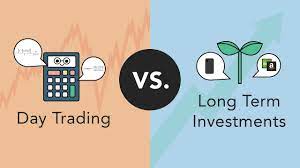Investing in the stock market is a popular way to build wealth over time. However, there are different strategies to choose from, such as day trading and long-term investing. In this article, we’ll explore the differences between these two strategies and help you decide which one is right for you.

What is Day Trading?
Day trading is a short-term trading strategy that involves buying and selling securities within the same day. The goal of day trading is to make a profit by taking advantage of small price movements in the market. Day traders use technical analysis and charting tools to identify short-term trading opportunities and execute trades quickly.
While day trading can be lucrative, it also carries a higher level of risk compared to long-term investing. The market can be unpredictable, and price movements can happen rapidly, which can result in significant losses if the trader is not careful.
Advantages of Day Trading –
One advantage of day trading is the potential for higher profits in a shorter amount of time. Since day traders are buying and selling securities frequently, they have the opportunity to make more trades and potentially earn more profits than long-term investors.
Another advantage of day trading is the ability to make money regardless of the overall direction of the market. Day traders can make profits whether the market is going up, down, or sideways. This can be beneficial in volatile market conditions.
Disadvantages of Day Trading –
One disadvantage of day trading is the higher level of risk. Since day traders are trading frequently, they may be more susceptible to emotional trading and making impulsive decisions. This can result in significant losses if the trader is not careful.
Another disadvantage of day trading is the need for constant attention. Day traders must monitor the market throughout the day and be ready to execute trades quickly. This can be time-consuming and may not be suitable for those who have other obligations.
What is Long-Term Investing?
Long-term investing is a strategy that involves buying and holding securities for an extended period of time, typically several years or more. The goal of long-term investing is to build wealth over time by taking advantage of the power of compounding.
Long-term investors typically focus on fundamental analysis, which involves analyzing the financial health of a company and its potential for future growth. They look for companies that have a strong competitive advantage, solid financials, and a good management team.
Advantages of Long-Term Investing –
One advantage of long-term investing is the potential for higher returns over time. Since long-term investors are holding securities for several years or more, they have the potential to earn higher returns than day traders.
Another advantage of long-term investing is the lower level of risk compared to day trading. Long-term investors are less susceptible to emotional trading and market volatility since they are not concerned with short-term price movements.
Disadvantages of Long-Term Investing –
One disadvantage of long-term investing is the potential for missed opportunities. Since long-term investors are holding securities for an extended period of time, they may miss out on short-term trading opportunities that could result in quick profits.
Another disadvantage of long-term investing is the need for patience. Long-term investing requires a long-term mindset and the ability to stay invested even during periods of market volatility.
Which Strategy is Right for You?
Deciding between day trading and long-term investing depends on your financial goals, risk tolerance, and available time. If you are looking for quick profits and have the time and resources to dedicate to day trading, then day trading may be right for you. However, if you are looking for a long-term investment strategy and are willing to be patient, then long-term investing may be the better choice.
It’s important to remember that both day trading and long-term investing carry risks and rewards, and neither strategy is guaranteed to be successful. It’s important to do your research, set realistic expectations, and have a well-defined investment plan before choosing either strategy.
If you’re a beginner and not sure where to start, it may be wise to start with long-term investing. This strategy can help you build a solid foundation for your investment portfolio while you learn about the market and gain experience.
However, if you decide to pursue day trading, it’s crucial to have a solid understanding of technical analysis and risk management. Day trading requires a significant amount of time, dedication, and discipline to be successful.
In conclusion, both day trading and long-term investing are viable investment strategies that can help you build wealth over time. The decision of which strategy to choose ultimately depends on your financial goals, risk tolerance, and available time. By doing your research and developing a well-defined investment plan, you can increase your chances of success in either strategy.

Pingback: Avoid These Costly Mistakes in your Investing Journey - Fool Investor